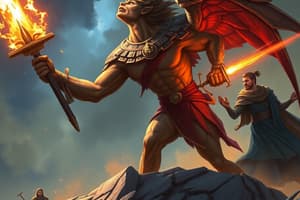Podcast
Questions and Answers
What is the main tactic used to exercise expert power?
What is the main tactic used to exercise expert power?
- Rational persuasion tactic (correct)
- Ingratiation tactic
- Personal appeal tactic
- Inspirational appeal tactic
Which of the following is NOT a method to increase expert power?
Which of the following is NOT a method to increase expert power?
- Project a negative self-concept (correct)
- Keep up with the latest technology
- Read relevant publications
- Absorb all training opportunities
Referent power is primarily derived from what type of relationships?
Referent power is primarily derived from what type of relationships?
- Transactional relationships
- Personal relationships (correct)
- Task-oriented relationships
- Professional relationships
Which tactic involves arousing enthusiasm to influence followers?
Which tactic involves arousing enthusiasm to influence followers?
Which of the following correctly describes information power?
Which of the following correctly describes information power?
What is a potential risk of using the ingratiation tactic?
What is a potential risk of using the ingratiation tactic?
To effectively exercise referent power, a leader should focus on what?
To effectively exercise referent power, a leader should focus on what?
Which type of power is exercised through rational persuasion and inspirational appeals?
Which type of power is exercised through rational persuasion and inspirational appeals?
Which tactic involves leaders exchanging favors to reinforce their authority?
Which tactic involves leaders exchanging favors to reinforce their authority?
What must a leader do to increase their reward power effectively?
What must a leader do to increase their reward power effectively?
Which power is based on a leader's ability to punish or withhold rewards?
Which power is based on a leader's ability to punish or withhold rewards?
What is a potential consequence of using coercive power excessively?
What is a potential consequence of using coercive power excessively?
What should a leader avoid when using coercive power?
What should a leader avoid when using coercive power?
Which of the following best describes expert power?
Which of the following best describes expert power?
Which action can help a leader increase coercive power?
Which action can help a leader increase coercive power?
What underlying principle is a key feature of reward power?
What underlying principle is a key feature of reward power?
What is the primary purpose of coalitional leaders visiting customers and stakeholders?
What is the primary purpose of coalitional leaders visiting customers and stakeholders?
Which type of stakeholder is described as opposing change efforts?
Which type of stakeholder is described as opposing change efforts?
How should leaders view themselves according to the guidance provided?
How should leaders view themselves according to the guidance provided?
What key action do coalitional leaders take to ensure collaboration across departments?
What key action do coalitional leaders take to ensure collaboration across departments?
Which statement reflects Niccolo Machiavelli's perspective on leadership?
Which statement reflects Niccolo Machiavelli's perspective on leadership?
What type of stakeholder supports change but does not take an active role in leading it?
What type of stakeholder supports change but does not take an active role in leading it?
What should leaders anticipate as part of their responsibility?
What should leaders anticipate as part of their responsibility?
In the context of coalitional leadership, what is the significance of having conversations across the organization?
In the context of coalitional leadership, what is the significance of having conversations across the organization?
Which frame of reference emphasizes planning, setting goals, and clarifying expectations?
Which frame of reference emphasizes planning, setting goals, and clarifying expectations?
In which frame do leaders focus primarily on relationships and empowering followers?
In which frame do leaders focus primarily on relationships and empowering followers?
What does the Political Frame view the organization as?
What does the Political Frame view the organization as?
Leaders operating within the Symbolic Frame are most concerned with which of the following?
Leaders operating within the Symbolic Frame are most concerned with which of the following?
Which of the following best describes leaders in the Political Frame?
Which of the following best describes leaders in the Political Frame?
How do leaders in the Human Resource Frame differ in their approach to influence?
How do leaders in the Human Resource Frame differ in their approach to influence?
Which frame of reference is likely to depict the organization as a clan?
Which frame of reference is likely to depict the organization as a clan?
What common aspect do all four frames of reference share regarding leadership effectiveness?
What common aspect do all four frames of reference share regarding leadership effectiveness?
What is the primary purpose of a leader's power?
What is the primary purpose of a leader's power?
Which of the following is NOT one of the principles for asserting leader influence?
Which of the following is NOT one of the principles for asserting leader influence?
How does appealing to a higher vision affect people's behavior?
How does appealing to a higher vision affect people's behavior?
What is a key component of rational persuasion?
What is a key component of rational persuasion?
Which influence tactic is most likely to be effective if a leader has expert power?
Which influence tactic is most likely to be effective if a leader has expert power?
Which influence tactic focuses on building personal relationships with others?
Which influence tactic focuses on building personal relationships with others?
Why is it important for leaders to understand their own natural frame?
Why is it important for leaders to understand their own natural frame?
What role does the principle of reciprocity play in leader influence?
What role does the principle of reciprocity play in leader influence?
Flashcards are hidden until you start studying
Study Notes
Expert Power
- Expert power is based on a leader's skill and knowledge. This makes others dependent on the leader.
- This is often seen as a rational persuasion tactic.
- To increase expert power:
- Absorb all training and educational opportunities offered.
- Attend professional meetings, read publications, write for publication, and stay updated on technology.
- Project a positive self-image and demonstrate expertise.
Referent Power
- Referent power is based on personal relationships with others. It relies on loyalty and friendship.
- Charismatic leaders often have referent power.
- To increase referent power:
- Develop relevant skills.
- Build and maintain positive relationships with peers and managers.
Information Power
- Information power is based on access to vital data and knowledge. The leader controls its distribution.
- The influencing tactics for information power are rational persuasion and inspirational appeals.
Reward Power
- Reward power is based on a leader's ability to bestow rewards on others.
- This can be based on the leader's control over promotions, raises, and other rewards.
Coercive Power
- Coercive power is based on a leader's ability to withhold rewards and punish.
- Leaders with this power can use fear of reprimand, probation, suspension, or dismissal.
- Employees often resent coercive power, so it should be used sparingly.
Coalitional Leadership
- Effective coalitional leadership involves multiple steps:
- Talk to many people across the organization.
- Visit customers and other stakeholders.
- Develop a map of stakeholder buy-in to identify advocates, partners, resisters, and observers.
- Break down barriers and promote collaboration across departments.
Machiavellian-Style Leadership
- Niccolo Machiavelli was an Italian philosopher who wrote "The Prince" as a guide to acquiring and using power.
- He argued that the ends justify the means to achieve one's goals.
- This leadership style emphasizes planning, goal-setting, and clarifying expectations to ensure order, efficiency, and stability.
Frames of Reference for Leadership
- The Structural Frame sees the organization as a machine and emphasizes efficiency and data analysis.
- The Human Resource Frame views the organization as a family and focuses on meeting human needs.
- The Political Frame sees the organization as an arena for conflict and the allocation of resources.
- The Symbolic Frame views the organization as a system of shared meaning and focuses on culture and values.
Principles for Asserting Leader Influence
- Appeal to a Vision or Higher Purpose: Frame requests in a meaning-filled way to encourage buy-in.
- Use Rational Persuasion: Use facts, data, and logic to persuade others.
- Help People to Like You: Build positive relationships to improve influence.
Studying That Suits You
Use AI to generate personalized quizzes and flashcards to suit your learning preferences.




